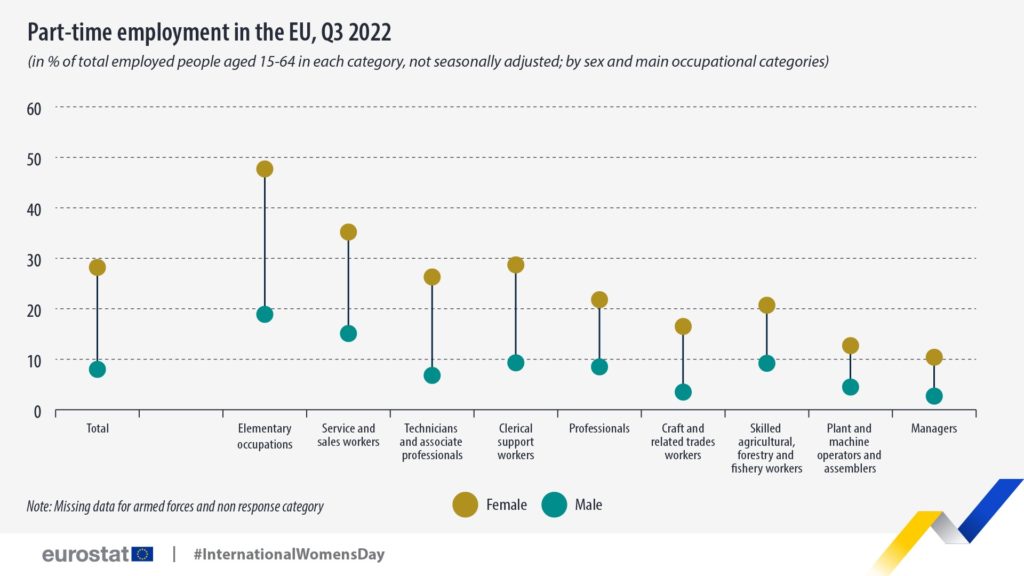In today’s dynamic workplace, part-time employment has become increasingly popular among male workers in Switzerland.
Traditionally associated with women due to family commitments, the concept of part-time work has now evolved to encompass a more inclusive and balanced approach to professional life. We will explain what is behind the growing interest in part-time work among men in Switzerland, the reasons behind this shift, and the benefits of partnering with a payrolling company to navigate this new landscape.
Over the past few decades, we’ve seen a significant rise in women entering the workforce and choosing part-time work to balance their family responsibilities. This has undoubtedly influenced the perception of part-time work, seen as the go-to solution for women. Recently, however, men have increasingly recognized the benefits of achieving a better work-life balance and exploring new career opportunities. They too want to spend quality time with their families, pursue personal interests, or even transition into retirement gradually. This changing dynamic is breaking down traditional gender stereotypes and paving the way for more inclusive work environments.
For anyone involved in recruitment it is fascinating to see how societal attitudes are evolving. A recent survey conducted by Sotomo Research Institute found that “Both men and women agreed that the ideal workload for fathers is 80% of their time spent in the office – or four days a week.” A quick look at some statistics shows the increasing popularity of part-time work among men in Switzerland. Recent data shows that the number of men working part-time in Switzerland has been steadily increasing since the 1990s. In 2021, 18.1% of employed men in Switzerland worked part-time, which represents a rise of 0.9 percentage points compared to the previous five years. Additionally, by 2022, part-time work accounted for 37% of the active workforce in Switzerland, a significant increase from the 25% reported in 1991. These figures indicate a shift towards a more balanced and flexible approach to professional life for both men and women.
There is less part-time work being undertaken by male non-Swiss nationals resident in the country since the majority come to work on full-time contracts.
Why is part-time work so prevalent in Switzerland?
Simply put, Swiss people can afford to do it. Switzerland has higher salaries compared to most European countries, allowing many households to afford a reduced work schedule without significantly impacting their quality of life. In addition, Swiss employers benefit from a very liberal labour regime with very few procedures and few if not any dependence on disputes between unions and employers. This gives Swiss companies more freedom to organize work and offer part-time arrangements based on their needs and those of their employees. Switzerland comes in behind The Netherlands where 4,5 million people, mostly women, work part-time.

The key reasons behind this growing interest in part-time work among male workers in Switzerland
First and foremost, achieving a better work-life balance has become a top priority for many individuals, especially in the post-COVID era. Men, just like women, desire more time to focus on personal or family situations or pursuing further education. Part-time work provides the flexibility needed to strike that balance effectively.
Secondly, the desire for flexibility is now something that men are sharing with women and is behind their decision to opt for part-time work. Being able to control one’s work schedule and have more free time is highly valued. It allows individuals to pursue personal interests, engage in hobbies, or even start their own ventures.
Lastly, the opportunity to explore new career paths is another significant driver. With longer life expectancies, both men and women are realizing that they can embark on new endeavors later in life. Working part-time provides the freedom to dedicate time to further education, learn new skills, or even start a business. It’s an empowering way to pursue new goals and aspirations and, perhaps, to ease into retirement.
How can partnering with a payrolling company simplify the process for individuals considering part-time work?
Partnering with a payrolling company like The Business Harbour can be a game-changer for individuals transitioning from full-time employment to part-time work. When you choose to work with a payrolling company it eliminates the need for you to navigate the complexities of becoming an independent worker and dealing with legal registrations and funding. The payrolling company takes on the responsibility of all the administration tied to processing your monthly salary and it handles all legal deductions, ensuring that you can focus on your work.
One valuable support that payrolling companies provide is negotiation assistance, which becomes crucial when entering into a part-time work arrangement. A salary portal company can offer platforms with tools and resources to help you negotiate your salary effectively. Additionally, they employ professionals experienced in recruitment, tax, and social security, who provide insights into average salaries, benefits, and other factors. This empowers you to obtain the best contracts with the clients, ensuring a successful transition to part-time work while maximizing your compensation and benefits. By contacting a payrolling company, you can explore the various options available to you and understand how their services can support and enhance your new part-time career.
If you are considering a move to part-time work, contact us at The Business Harbour! We will explain the entire process to you, from handling your monthly salary to managing legal obligations, making your transition to part-time work, work for you!
Sources : Eurostat
Eurostat : https://ec.europa.eu/eurostat/web/products-eurostat-news/w/EDN-20230303-1
Office fédéral de la statistique (OFS), section Démographie et migration
Institut de recherche Sotomo










